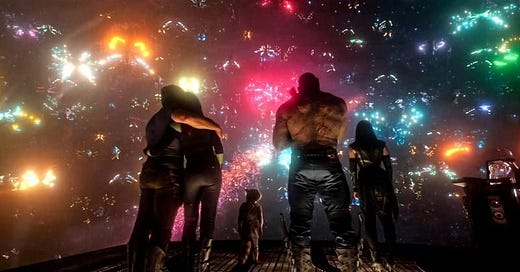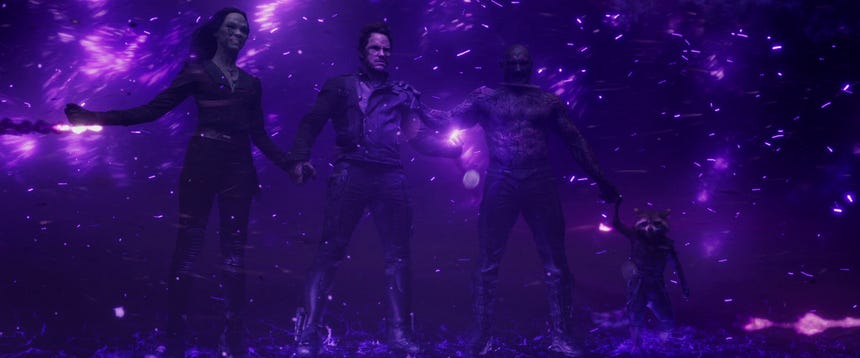This is a part of my “What Makes A Hero” series. If you like what you read in this post, you can find the rest of the series here.
The Guardians of the Galaxy are a fun bunch because they’re not traditionally heroic. They’re relatable because they’re damaged and love each other, which is why they’ve endeared themselves to us so strongly. And before you get all defensive of their heroism—they became friends in a maximum security prison.
So let’s look at our favorite bunch of redeemed ex-criminals to understand their guiding system of ethics: Care Ethics.
Some Backstory
Before Care Ethics, there was Lawrence Kohlberg (1927–1987), an American psychologist who took great interest in moral development. Kohlberg studied moral development by interviewing boys and asking them questions about how they’d respond to moral dilemmas. Instead of examining their final answers, Kohlberg took great interest in their moral reasoning over decisions.
Kohlberg concluded that there are three levels to moral development, all of which we’ll be illustrating with Rocket Raccoon.
Level 1: Pre-Conventional
Stage 1: Obedience and punishment orientation
How can I avoid punishment?
“I’ve escaped twenty-two prisons, this one’s no different.” – When getting incarcerated.
Stage 2: Self-interest orientation
Paying for a benefit
“What has the Galaxy ever done for you? Why would you wanna save it?” – When confronted with risking his life for the Galaxy.
Level 2: Conventional
Stage 3: Interpersonal accord and conformity
Social norms
“We’re all standing up now. Bunch of jackasses standing in a circle.” – Joining the Guardians in the suicide mission to fight off Ronan.
Stage 4: Authority and social-order maintaining orientation
Law and order morality
“I sent word to Yondu’s old Ravager buddies and told them what he did.” – Getting Yondu the Ravager funeral he deserved, his name cleared, and his actions recognized.
Level 3: Post-Conventional
Stage 5: Social contract orientation
A greater good for people at large
No, representative quote, but Rocket joins the Avengers in Endgame out of a sense of duty after losing the Guardians of the Galaxy.
Stage 6: Universal ethical principles
Principled conscience, beliefs in something higher
“We have to save them… No, Pete, the rest of them.” – Risking his life to save all of the animals aboard the High Evolutionary’s ship.
And Along Came a Response
Carol Gilligan (born 1936), a student of Kohlberg, took issue with the findings. Her critique was of the heavily male sample for the research, and she pointed out that men and women think differently.
Gilligan claimed that men generally process moral dilemmas in an abstract, theoretically principled, justice-oriented fashion, while the reasoning of women is often more empathetic, situational, and relationship-oriented.
Hence, Care Ethics was born.
Care Ethics, a supplementation to Kohlberg’s work rather than a rebuttal, is rooted in relationship dynamics and empathy rather than laws and outcomes. Virtue in this ethical framework is acting in a way that nurtures the relationships of the actors, as well as their personal well-being. The sins of this system are acting in ways that are harmful to relationships and the people involved.
Care Ethics is built on the premise that every situation is unique and thus the context defines the correct course of action. The unique needs of the people involved inform what “right” and “wrong” mean in each context.
Our Plucky Heroes
The Guardians of the Galaxy start off incredibly self-serving. They’re all varying levels of cutthroat, generally impolite, and are incredibly comfortable leaving people to die. As the first movie develops, so do their friendships.
By the end of the first movie, it’s their loyalty to each other that prompts them to follow Quill into battle. When Quill holds the Power Stone, it starts to shred him. He gets saved by his friends taking on equal shares of the burden, saving him and the galaxy.
In the second movie, they adopt Yondu, Kraglin, and Mantis, but they’re still pretty comfortable killing anyone who gets in their way. They get on the fence about Nebula, illustrated by Drax telling her, “We’re family. We leave no one behind… except maybe you.”
When Quill harnesses his power to defeat Ego and save the universe, he says, “You shouldn’t have killed my mom and squished my Walkman!” It was deeply personal start to finish.
Upon killing Ego, Yondu and Quill make their escape. Yondu says to Quill, “He may have been your father, boy, but he wasn't your daddy.” The emphasis on the variety of relationships and the dynamism of responsibilities is heavily emphasized in the fathers of these movies. Compare Quill’s two dads: Yondu and Ego. Hell, compare Groot’s three dads: Quill, Drax, and Rocket. Don’t even get me started on Thanos. The whole franchise is about acting justly through following your heart.
In the third movie, they reach post-conventional morality guided by Care Ethics. They risk themselves to save all of the animals aboard the High Evolutionary’s ship in a sci-fi Noah’s Ark situation. When the third movie ends, everyone goes their separate ways to pursue the relationships that require the most attention:
Quill goes to his grandfather
Drax and Nebula adopt a ton of kids and stay on Knowhere
Rocket and Groot lead the new Guardians of the Galaxy
Mantis takes the time she needs for herself
Gamora took time to talk to Quill before returning to the Ravagers
All in all, the Guardians of the Galaxy aren’t philosophers or believers in anything all that grand-scale: they just love each other. That’s it—and that’s enough.
Stay tuned
Next time we’ll be looking at the moral evolution of Wolverine through the lens of Existentialism. It’s kind of a huge deal.







